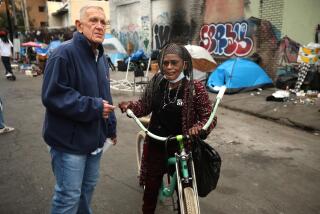A Safety Net Collapses
- Share via
SAN DIEGO — Marie Everhart, 75, sitting beneath a tree outside City Hall, worries about what will happen to people like her, people who are homeless in the place that calls itself America’s Finest City.
“It’s going to be bad, awful bad. There are bad things that happen on the streets, especially to women,” said Everhart, a widow who said she has been harassed and robbed repeatedly while living on the streets.
The city’s main provider of shelter and services for the homeless has hit a fundraising crunch and last week shut down two heavily used daytime programs.
Hundreds of homeless people who otherwise would spend their days at the St. Vincent de Paul Village east of Petco Park are instead roaming the sometimes dangerous downtown streets.
So far, the center has been able to maintain its 900-bed overnight shelter program and its dining, job-training, child-care and healthcare services.
But Catholic Msgr. Joseph Carroll, president of St. Vincent’s, is afraid for all the programs he has spent 25 years developing if fundraising doesn’t improve.
“I just hope this is where it ends,” he said.
Long known in the local media as the “hustler-priest” for his indefatigable fundraising, Carroll hopes to jump-start efforts with a plaintive mailer to past donors and some splashy events, including a Thanksgiving Day Father Joe 5K run and walk. He even agreed to a request from staff members to allow the sale of Father Joe bobble-head dolls.
The lack of funds led Carroll to close his day center, where hundreds of homeless people could shower, relax and maybe make job or housing contacts.
Also, 280 men and 70 women staying in one of the three residential shelters must vacate each day between 7 a.m. and 5 p.m. because Carroll cannot afford to pay employees to supervise the shelter during the day. Many have begun sleeping and panhandling on the streets. Some may resume abusing drugs or alcohol, Carroll said.
Luis House, 31, who has stayed at St. Vincent’s, echoed Carroll’s concern.
“It’s going to get real crazy out there as people start sleeping in front of these condos and in the parks,” House said. “There’s lots of bad stuff going on out there.”
Carroll said his efforts have been hampered by two recent developments that other charitable groups have also noted:
* A “compassion collapse” after massive charity efforts for victims of Sept. 11, the Indian Ocean tsunami and Hurricane Katrina.
* A change in federal law tightening the rules on tax write-offs for donating cars to charity.
The result has been a $3-million drop in donations, a 10% decrease that has caused Carroll to lay off about 50 employees.
Carroll had hoped that Randy “Duke” Cunningham, a longtime supporter of St. Vincent’s, would use his influence in Congress to get the government to loosen the car-donation rules. But Cunningham, who pleaded guilty to tax evasion and bribery, is now in prison, despite a letter to the judge from Carroll pleading for mercy.
Carroll has turned to Cunningham’s successor, Rep. Brian Bilbray (R-Carlsbad), another longtime supporter. Bilbray’s staff is working on the car-donation issue, but it could require passage of legislation, a slow process.
He also turned to the downtown representative on the City Council, but the council is beset with money problems and distracted by internecine warfare with the city attorney.
The staff of City Councilman Kevin Faulconer is trying to see if the city’s smaller programs benefiting the homeless can accommodate some of the people who have depended on St. Vincent’s. But those programs have their own funding and space issues.
“Father Joe has been a cornerstone in providing social services to the homeless population in San Diego,” said Faulconer.
Michael Stepner, a longtime city planner, architect and a major figure in the development of downtown, said Carroll “has been the leader in calling attention to the problem of the homeless and trying to do something about it.”
A sign in the lobby of the St. Vincent’s administration office seems to be mocked by the current problem: “Recovery Is My Fix in 2006. St. Vincent’s.”
Closing the day center could lead some homeless people to give up on recovery, Carroll said.
“The idea is that even if you’re living on the street, you can be clean,” he said.
“If you’re clean, you can begin to change your life. When you stay dirty for a long time, you tend to give up,” he said.
Veronica Simmons, 47, a St. Vincent’s resident for two months, made her own lobbying trip Thursday to City Hall, about 20 blocks from St. Vincent’s. She talked to a council member’s aide.
“I told him: ‘This is a big rich city. Look at those nice new hotels and Petco Park. Why can’t they do something for us?’ ” she said.
“He said the city doesn’t have any money.”
At 65, the Bronx-born Carroll is slowed by diabetes, two strokes and bad knees. He is the veteran of numerous zoning and permit skirmishes with City Hall and has been in and out of favor with local politicians. His programs are independent of the local Catholic diocese.
John Moores, owner of the San Diego Padres, is a major patron. The main building at St. Vincent’s -- where 1,500 meals are served daily -- is named for another patron, the late Joan Kroc, the McDonald’s heiress.
At an age when others might be slowing down, Carroll, until the fundraising snag, was talking of expanding his programs, as he sees the nation further dividing into haves and have-nots, even in tourist-beckoning San Diego.
“People say: Why do I keep doing it?” Carroll said. “Because I know it works. To put people back on the streets, back where there are drugs and other things, that hurts me.”
More to Read
Sign up for Essential California
The most important California stories and recommendations in your inbox every morning.
You may occasionally receive promotional content from the Los Angeles Times.













